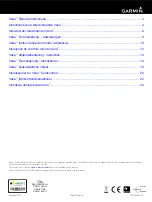
58
59
gearS
DERAILLEUR GEARS
The gears
(a+b)
of your BiXS bicycle serve to adjust the gear ratio to
the terrain you are riding on and the desired speed. A low gear (where
in the case of derailleur gears the chain runs on the small chainring
and a large sprocket) allows you to climb steep hills with moderate
pedalling force. You must, however, pedal at a faster pace. High gears
(large chainring, small sprocket) are for riding downhill. Every turn of the
pedals takes you many metres forward at correspondingly high speed.
A
Practise switching gears in a place free of traffic until you
are familiar with the functioning of the levers or twist grips
of your BiXS bicycle.
I
Read the gear manufacturer’s operating instructions, which
you can find on the enclosed CD, and practise shifting gears
until you are familiar with this operation before you set off
for the first time.
operation and Control
Derailleur gears always work according to the following principle:
Large front chainring – high/heavy gear – higher gear ratio
Small chainring front – low/easy gear
– lower gear ratio
Large rear sprocket – low/easy gear
– lower gear ratio
Small rear sprocket
– high/heavy gear – higher gear ratio
Normally, the shifters are mounted as follows:
Shift lever right
– rear sprockets
Shift lever left
– front chainrings
Modern mountain bikes can have up to 30 gears. As there are, how-
ever, overlapping ranges, actually 15 to 18 gears are usable. It is not
advisable to use gears which involve an extremely oblique run of the
chain, as this reduces power transmission efficiency and hastens wear
of the chain. An unfavourable run of the chain is when the smallest
chainring is used with one of the two or three outermost (smallest)
sprockets
(c)
or when the largest chainring is used with one of the
inmost (largest) sprockets
(d)
.
The bottom bracket
(e)
is the interface between the cranks and the
frame. There are different designs, in some cases the bearing spindle
is part of the bottom bracket, in some other cases it is integrated into
the right crank. Sealed bottom brackets are maintenance free and de-
livered without play ex works. The bottom bracket in the frame must be
checked for play at regular intervals.
Also check at regular intervals whether the cranks are firmly attached
to the bearing spindle or whether there is play. Grab the crank and try
to jiggle it forcefully. It must be absolutely free of play. If you notice any
play, contact your BiXS bicycle dealer immediately.
Depending on the gear system, gear shifting is initiated by actuating
a shift lever, a brake and shift lever unit or by a short turn of the wrist
with twist grips. Continue pedalling during gear shifting, however, with
reduced pedalling force.
Please find below the principles of the shift lever types and their opera-
tion. It is, however, also possible that your new BiXS bicycle has a gear
system that is not listed below.
In the case of shifters pressing the large shifter (thumb shifter)
(f)
moves the chain towards the larger chainrings/sprockets.
That means that any gear shift made by pressing the large thumb shift-
er on the right produces a lower gear. This is an indexed shifting system
with the option of shifting several gears with one action. Actuating the
large thumb shifter on the left produces a higher gear.
Pulling the small lever
(g)
located in front of the handlebars from the
rider’s viewpoint and actuated with the index finger
(index finger lever)
shifts the chain towards the smaller chainrings/sprockets, i.e. on the
right side to the higher gears and on the left side to the lower gears.
I
The manufacturers of gears normally provide detailed in-
structions, and these are on the enclosed CD. Read them
thoroughly. Make yourself familiar with your new gears in
an area free of traffic, if necessary. If you are in doubt or if
you have any questions, please contact your BiXS bicycle
dealer.
The principle of
twist grips
(h)
is different. Turning the right-hand grip
towards you makes for a lower gear ratio, while the same movement on
the left produces a higher gear – and vice versa. The shifting direction
may vary in this case, as well.
a
b
c
d
e
f
g
h
Summary of Contents for Chamois
Page 69: ......
















































